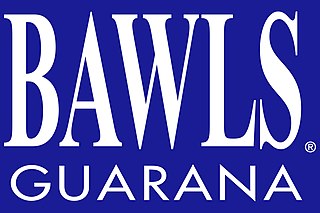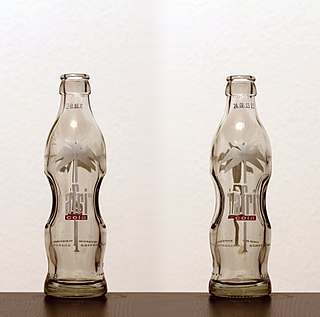
Cola is a carbonated soft drink flavored with vanilla, cinnamon, citrus oils, and other flavorings. Cola became popular worldwide after the American pharmacist John Stith Pemberton invented Coca-Cola, a trademarked brand, in 1886, which was imitated by other manufacturers. Most colas originally contained caffeine from the kola nut, leading to the drink's name, though other sources of caffeine are generally used in modern formulations. The Pemberton cola drink also contained a coca plant extract. His non-alcoholic recipe was inspired by the coca wine of pharmacist Angelo Mariani, created in 1863.

A soft drink is any water-based flavored drink, usually but not necessarily carbonated, and typically including added sweetener. Flavors used can be natural or artificial. The sweetener may be a sugar, high-fructose corn syrup, fruit juice, a sugar substitute, or some combination of these. Soft drinks may also contain caffeine, colorings, preservatives and other ingredients.

Starbucks Corporation is an American multinational chain of coffeehouses and roastery reserves headquartered in Seattle, Washington. It was founded in 1971 by Jerry Baldwin, Zev Siegl, and Gordon Bowker at Seattle's Pike Place Market initially as a coffee bean wholesaler. Starbucks was converted into a coffee shop serving espresso-based drinks under the ownership of Howard Schultz, who was chief executive officer from 1986 to 2000 and led the aggressive expansion of the franchise across the West Coast of the United States.

Cha chaan teng, often called a Hong Kong-style cafe or diner in English, is a type of restaurant that originated in Hong Kong. Cha chaan tengs are commonly found in Hong Kong, Macau, and parts of Guangdong. Due to the waves of mass migrations from Hong Kong in the 1980s, they are now established in major Chinese communities in Western countries such as Australia, Canada, the United Kingdom, and the United States. Likened to a greasy spoon cafe or an American diner, cha chaan tengs are known for eclectic and affordable menus, which include dishes from Hong Kong cuisine and Hong Kong-style Western cuisine. They draw comparisons to Western cafés due to their casual settings, as well as menus revolving around coffee and tea.

Diet or light beverages are generally sugar-free, artificially sweetened beverages with few or no calories. They are marketed for diabetics and other people who want to reduce their sugar and/or caloric intake.

Tab was a diet cola soft drink produced and distributed by The Coca-Cola Company, introduced in 1963 and discontinued in 2020. The company's first diet drink, Tab was popular among some people throughout the 1960s and 1970s as an alternative to Coca-Cola. Several variations were made, including a number of fruit-flavored, root beer, and ginger ale versions. Caffeine-free and clear variations were released in the late 1980s and early 1990s.

Bawls is a non-alcoholic, highly-caffeinated soft drink.

Afri Cola is a cola soft drink produced in Germany. The trademark Afri-Cola was registered in 1931 by the company F. Blumhoffer Nachfolger GmbH. The same company also produced Bluna, an orange soft drink. Today the brand belongs to the Mineralbrunnen Überkingen-Teinach AG. Afri Cola was once one of the most popular cola brands in Germany, but has lost considerable market share since the 1960s.
The Center for Science in the Public Interest (CSPI) is a Washington, D.C.–based non-profit watchdog and consumer advocacy group that advocates for safer and healthier foods.
Enviga is a Nestea carbonated canned green-tea drink. Enviga is a trademark of Nestlé licensed to Beverage Partners Worldwide, a joint venture between The Coca-Cola Company and Nestlé. It is available in three flavors: Green Tea, Tropical Pomegranate, and Mixed Berry. According to Coca-Cola, Enviga burns 60 to 100 calories per three 12-oz.(330 ml) cans due to its high EGCG and caffeine content. The makers of the drink were sued for making fraudulent health claims about weight loss, and agreed to settle and cease repeating them.

Coffee culture is the set of traditions and social behaviors that surround the consumption of coffee, particularly as a social lubricant. The term also refers to the cultural diffusion and adoption of coffee as a widely consumed stimulant. In the late 20th century, espresso became an increasingly dominant drink contributing to coffee culture, particularly in the Western world and other urbanized centers around the globe.

Blue Sky Beverage Company was a beverage company that produced soft drinks and energy drinks. It is a wholly owned subsidiary of the Monster Beverage Corporation. The company was established in Santa Fe, New Mexico, in 1980, where it remained until it was purchased by Monster in 2000. Coca-Cola North America took ownership of Blue Sky Sodas, Hansen’s Juice Products, Hansen’s Natural Sodas, Hubert’s Lemonade, Peace Tea and other non-energy drink brands as part of Coke’s partnership with Monster Beverage Corp on Jun 12, 2015. Blue Sky Beverage Company now operates out of Corona, California. The southwestern look and feel of the artwork on the soda cans is reminiscent of the company's roots in New Mexico.

A sugary drink tax, soda tax, or sweetened beverage tax (SBT) is a tax or surcharge designed to reduce consumption of sweetened beverages by making them more expensive to purchase. Drinks covered under a soda tax often include carbonated soft drinks, sports drinks and energy drinks. Fruit juices without added sugar are usually excluded, despite similar sugar content, though there is some debate on including them.
Zevia is a Los Angeles based company that produces soft drinks, organic tea, energy drinks, and mixers sweetened with stevia. All Zevia products are zero-calorie, sugar-free, gluten free, vegan, certified kosher, and certified by The Non-GMO Project. In June 2021, Zevia filed to go public with an IPO.

The sugary drinks portion cap rule, also known as the soda ban, was a proposed limit on soft drink size in New York City intended to prohibit the sale of many sweetened drinks more than 16 fluid ounces in volume to have taken effect on March 12, 2013. On June 26, 2014, the New York Court of Appeals, the state's highest court, ruled that the New York City Board of Health, in adopting the regulation, exceeded the scale of its regulatory authority and as such, was repealed. The repealed regulation was codified in section 81.53 of the New York City Health Code.

Sugar-sweetened beverages (SSB) are beverages with added sugar. They have been described as "liquid candy". Added sugars include brown sugar, corn sweetener, corn syrup, dextrose, fructose, high fructose corn syrup, honey, invert sugar, lactose, malt syrup, maltose, molasses, raw sugar, sucrose, trehalose, and turbinado sugar. Naturally occurring sugars, such as those in fruit or milk, are not considered to be added sugars. Free sugars include monosaccharides and disaccharides added to foods and beverages by the manufacturer, cook or consumer, and sugars naturally present in honey, syrups, fruit juices and fruit juice concentrates.

Coming Together is a 2-minute ad created and distributed by the Coca-Cola Company and launched on the night of January 14, 2013, on several cable networks.

Sugar is heavily marketed both by sugar producers and the producers of sugary drinks and foods. Apart from direct marketing methods such as messaging on packaging, television ads, advergames, and product placement in setting like blogs, industry has worked to steer coverage of sugar-related health information in popular media, including news media and social media.
















